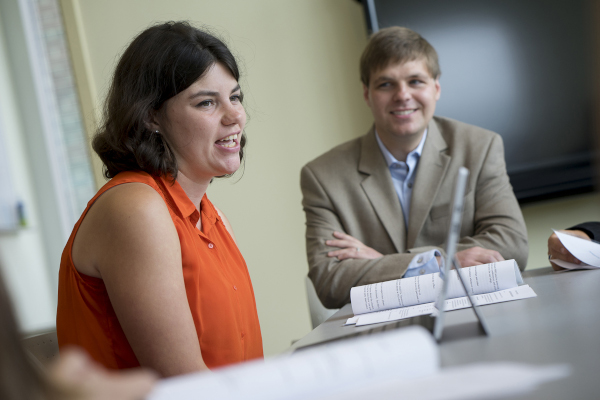
How DipLab works
The DipLab initiative allows select teams of faculty-supervised Purdue students to conduct research in areas of relevant to the State Department. Topics cover a wide array of international issues and challenges including climate change, sustainable development, human rights, economic policy, global health, energy security, conflict and stabilization.
Students participating in DipLab can contribute directly to national solutions. Throughout each semester students will discuss their research with State Department officials via video calls. Teams that develop exceptional results and ideas are acknowledged and may be invited to share their findings with senior State Department officials in Washington, D.C.

Get involved
Purdue faculty are invited to bid their interests on semester-long projects twice a year(usually, October for spring projects and March for fall projects). If selected, faculty will recruit a team of students to conduct research for one semester. Successful faculty applicants, who will be expected to have expertise in their project’s field of study, also will serve as their project’s point of contact for State Department officials. Professors are encouraged to incorporate DipLab in their curricula. Potential instructional models may include independent study opportunities, topical coursework, stand-alone research projects or a capstone program.
Projects
Take a closer look at the student-led research initiatives shaping solutions to global challenges.
Karen Marais, professor and associate head, School of Aeronautics and Astronautics
Properly interpreting international laws applicable to extraterrestrial resource extraction requires law and engineering expertise. This project aims to nurture this expertise in law and aerospace engineering students, drawing the interdisciplinary space law course, in which students learn relevant legal frameworks and how to communicate complex engineering topics to legal audiences. Students investigate the establishment of “safety zones” for lunar surface activities as contemplated in Artemis Accords Art. The Accords leave for later work the determination of the parameters of safety zones. This work requires sophisticated dialogue between lawyers and engineers. Our project will start that conversation.
Ashima Krishna, clinical associate professor, Honors College
Students examine the context and legal considerations related to the Sunda Strait and the remains of the USS Houston and prepare a comprehensive report with recommendations and considerations for a Marine Conservation Zone in the area and its impact on the local communities. Throughout the semester, students will research and examine international, maritime, and environmental law and the cultural, social, and environmental context of Indonesia and Jakarta in detail. Beyond traditional classroom texts and tools, students will employ cutting-edge visualization techniques through VisionPort, an immersive pedagogical tool housed in the John Martinson Honors College to explore the Sunda Strait, the USS Houston and the surrounding areas and communities. The course will culminate at the U.S. Embassy in Jakarta with the presentation of a project report to collaborators.
Ashima Krishna, clinical associate professor, Honors College
Students explore and analyze virtually available archival data through the Library of Congress, the National Archives and other sources like newspapers.com and ancestry.com. Next, students will travel to Washington D.C. over break to do extensive, in-person research in other local archives in Washington D.C. (at the DC History Center, DC Public Library, DC History Center and the District of Columbia Archives) and the National Archives in College Park, Maryland. Through VisionPort, an immersive pedagogical tool in the Honors College, students will present an interactive historical narrative and site report.
Ashima Krishna, clinical associate professor, Honors College; Nathan Swanson, clinical associate professor, director of study away, Honors College
Students will explore the physical, social and cultural geographies of several U.S. diplomatic facilities located within World Heritage Sites. They will then apply lessons learned to the U.S. chancery in Rome and create an ArcGIS StoryMap of their analysis. Beyond traditional classroom texts and tools, students will employ innovative visualization techniques through VisionPort, an immersive pedagogical tool housed in the Honors College, to virtually visit the case sites and present the Rome chancery maps in an interactive and dynamic way.
Roberto Gallardo, director of the Center for Regional Development and associate professor of agricultural economics
The Purdue Center for Regional Development (PCRD) has been working with communities — primarily rural — across the U.S., Canada and Mexico to increase awareness and develop joint strategies to tackle the digital divide. For example, PCRD is the lead entity helping the State of Indiana develop its first digital equity plan. Also, the center was the lead[AR1] in completing a report documenting the differences in digital access and use among disadvantaged groups in southern U.S. states. It has also published extensive work on internet availability, quality, adoption and use. PCRD also has developed innovative metrics (e.g., Digital Divide Index, Digital Distress) to help explain this complex issue. These metrics have been used by multiple states, national nonprofits and Congress. The center’s expertise can help the Diplomacy Lab by designing and conducting a mixed-methods approach through primary data-gathering efforts around internet availability, quality (speeds, reliability) and affordability, as well as documenting barriers to adoption and use. Working with partners, the deliverable would be a framework for national broadband. Some PCRD staff are fluent in both Spanish and English, and have conducted seminars in Colombia.
McGowan, associate professor of libraries administration; Matthew Hannah, associate professor of libraries administration
Mis-/disinformation provides opportunity for malicious acts that reduce public trust and sow confusion. To tackle this, McGowan and Hannah are developing strategies to identify mis-/disinformation. This Diplomacy Lab project was offered to students as a capstone project in spring 2022 to draft a report for the State Department to identify online mis-/disinformation. Students have worked toward creating a policy report as well as a social-listening dashboard that functions as a software application. The State Department planned to use the Purdue team’s results in training materials for its watch officers.
Robert Kenley, professor of engineering practice in the School of Industrial Engineering
Robert Kenley’s studies of recruitment of Native Hawaiians and Hispanic/Latinx Americans has expanded to add Native Americans and African Americans, due to significant student interest. These studies were offered in Kenley’s spring course, SYS 40000, as a part of the Purdue Systems Collaboratory’s Undergraduate Systems Certificate Program. Student teams were assigned to create specific methods to recruit members of minority groups to apply for positions within the State Department.
Anne Traynor, associate professor of educational studies
An interdisciplinary team of undergraduate students and a doctoral student mentor tackled the question, “Where are the Freely Associated States (FAS) students?” After the students completed a research-training and information-gathering phase, their team was assigned to produce a report about Micronesian college students’ locations, their school-choice processes and their majors. The team also was asked to formulate post-graduation plans that could be used by U.S. embassies and EducationUSA to better tailor educational counseling and outreach programs to future college students from the island nations of Micronesia, the Marshall Islands, and Palau.
Our initiatives
PPRI leads and partners on research projects that build capacity for data-driven decision-making.